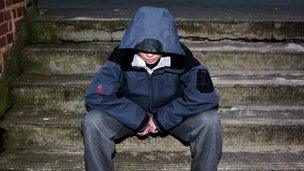Call to fine schools over illegal exclusions
- Published
Maggie Atkinson, Children's Commissioner for England: "Many parents don't even know what's going on is illegal"
Schools should be heavily fined if they falsify registers to cover up illegal exclusions, the children's commissioner for England, Maggie Atkinson, says.
Head teachers should also face existing sanctions of prosecution if they illegally exclude children, she says.
In a new report, Dr Atkinson says too many pupils are sent home "on the basis of no paperwork, no right of appeal".
The Association of School and College Leaders (ASCL) said the vast majority of schools acted within the law.
The commissioner's report, Always Someone Else's Problem, is based on research, school visits and a teachers' survey and examines the scale and nature of illegal exclusions in England's schools.
'Source of shame'
It found some schools were failing to follow the correct procedures to record exclusions, while others were placing pupils on "extended study leave", reduced timetables or into alternative schooling as a means of removing them.
Other schools were encouraging pupils to stay away, or urging parents to educate them at home or find another school, the report says, and a number were sending home children with special educational needs if their carer or teaching assistant was unavailable.
It suggests that, while illegal practice is far from the norm in England, an "unacceptably large proportion" of schools are acting illegally.

Thousands of children in England may be affected by illegal exclusions, suggests a study
The report condemned such practices as a "source of shame to the education system".
An anonymous survey of 200 head teachers for the report suggests that 6.7% of schools have sent children home for disciplinary reasons without recording it as an exclusion. This equates to about 1,600 schools in England.
It indicates 2.1% have recorded pupils as "authorised absent" or "educated elsewhere" when the school has in fact encouraged them to stay at home.
Some 1.8% of schools have encouraged parents to take their children out of school and educate them at home without recording it as an exclusion, suggests the data, while 2.7% sent home children with special educational or medical needs if their support assistant was unavailable.
Criminal offence
Dr Atkinson told the BBC: "In the final analysis, if you're a head teacher and you knowingly break the law, the same sort of consequences should visit you as if you're a businessman or a doctor or anybody else who breaks the law.
"If you're illegally excluding somebody, you may well be falsifying your registers - that's a criminal offence."
She described the difficulties faced by illegally excluded children as "legion".
Dr Atkinson said: "They may go to another school with no records, they may have been excluded for very long periods because nobody has written anything down and their chances are diminished.
"It's not safe for the school, let alone for the parents and the children concerned, that this is done informally and off the record."
The report says illegal exclusions may be an unintended consequence of school league tables and inspections, "which schools perceive as being very high-stakes issues for their reputations".
It recommends that illegal exclusions, once discovered, should immediately be reported to Ofsted.
It also argues that where a child has been illegally excluded for a period of one month, either in a continuous period or as a result of repeated short-term illegal exclusions, "the school should have a financial penalty imposed equal to the amount of funding it receives for that child annually".
Clear guidance
The survey also found significant ignorance of the law on exclusions among staff. For example, 31% of those surveyed did not know whether it was legal to encourage a parent to educate their child at home, while 24% did not know whether it was legal to falsify attendance records for a child who had been asked not to attend school.
The children most likely to be illegally excluded are often those least likely to be from families who know their rights, the report says.
Brian Lightman, general secretary of ASCL, said: "As the report states, the vast majority of schools act within the law.
"This is backed up by Ofsted inspections, which show that in secondaries across the country grades on behaviour, including judgements on how exclusion is used, are stronger than any other aspect.
"If schools are penalised financially, the ones who lose out are the students still enrolled at the school.
"Falsifying registers is already illegal and heads risk losing their jobs for it or even ending up in prison. The law is quite clear about this."
Russell Hobby, general secretary of the NAHT heads union, said: "Heads should always follow the letter the law and exclude legally if they have to exclude at all. But exclusion needs to remain as a final sanction in order to maintain discipline and safety in schools.
'Intervene earlier'
"Let's make sure the guidance is clear and simple and also backs school leaders' judgements when they are taken properly."
A Department for Education spokesperson said the report made clear that the majority of schools were staying within the law when it comes to exclusion.
"We will take seriously any evidence to suggest that a school is acting unlawfully.
"We want to reduce the need for exclusion across the board by supporting schools to manage behaviour and intervene earlier with those pupils at risk. We have also given teachers more powers than ever before to tackle behavioural issues."
Shadow School's Minister Kevin Brennan said the numbers of exclusions had dropped under Labour: "The government isn't doing enough to tackle illegal exclusions.
"Too many children are left languishing without education, storing up problems for the future. This report calls on the government to produce clear guidance on exclusions for schools."
- Published24 April 2013
- Published25 July 2012
- Published19 March 2012
- Published19 March 2012
- Published7 March 2012